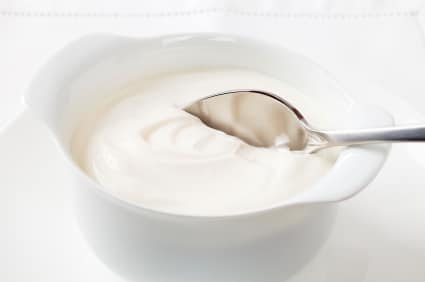 If you’ve been down the dairy aisle of the grocery store lately, no doubt you have noticed an increase in the variety of yogurts available. Greek yogurt, in particular, has skyrocketed in popularity. But what is the difference between Greek yogurt and regular yogurt?
If you’ve been down the dairy aisle of the grocery store lately, no doubt you have noticed an increase in the variety of yogurts available. Greek yogurt, in particular, has skyrocketed in popularity. But what is the difference between Greek yogurt and regular yogurt?
The Yogurt- Making Process
Yogurt is made when beneficial bacteria is added to milk causing the milk to begin to ferment. As the fermentation process progresses, the milk thickens and the taste becomes tangier. The resulting product is then strained through cheesecloth in order to remove the whey. Regular yogurt is strained twice, while Greek yogurt is strained three times. Because of the additional straining, Greek yogurt has a much thicker and creamier consistency.
Differences
Although both regular and Greek-style yogurts provide probiotics that contribute to digestive system health and both are nutritional powerhouses as far as health-food goes, there are some differences.
• Protein and carbohydrate content. Because regular yogurt is not as concentrated, its protein content is about half that of its Greek counterpart. Greek yogurt also has fewer carbohydrates than regular yogurt. The high-protein/low- carbohydrate combination may be why Greek yogurt has become so popular among diabetics, body-builders, and those pursuing a low-carb lifestyle.
• Calcium. Although both are considered good sources of calcium, regular yogurt sports about three times the calcium than its Greek cousin. For this reason, many doctors recommend that some populations who tend to be low on calcium should stick to the old-fashioned style of yogurt.
• Cost. Unfortunately, all of the high-protein, low-carb goodness contained in Greek yogurt comes with a price tag that is about double that of regular yogurt. The difference in cost may be due to the fact that it takes more milk to manufacture Greek-style yogurt.
Yogurt can be considered an ideal food for a number of reasons. Once a specialty item, Greek yogurt has quickly become a health-food staple by providing an extra boost of protein, fewer carbohydrates, and a creamier texture. Although they differ in some ways, both Greek and regular yogurt are considered good sources of probiotics, protein, and calcium.
Related Articles By Cathe:
Probiotics and Prebiotics: What’s the Difference and Why Does It Matter?
4 Science-Backed Reasons to Add More Fermented Vegetables to Your Diet
Can Probiotics Help with Exercise Recovery?
Fermented Foods vs. Probiotic Supplements: Is One Better Than the Other?
The Problem with Probiotic Supplements: Are They What They Seem to Be?
Top 4 Reasons to Cultivate Healthy Gut Bacteria

